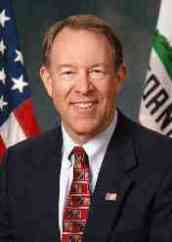On this quiet Sunday morning, be prepared to be blown away with the latest and one of the most evil ideas that has come along for the expansion of the Nanny State… The following is penned by longtime FR friend Bill Leonard, who serves as a member of the California State Board of Equalization…
 Pry the Thermostat from My Cold, Dead Hands
Pry the Thermostat from My Cold, Dead Hands
By Bill Leonard
I have written about the number of people leaving California for any number of reasons— high taxes, traffic congestion, poor public schools, burdensome business climate—but yesterday came word of a new one: the cooler cops. The California Energy Commission is proposing in its Title 24 regulations that newly installed heating and cooling systems in homes must have the ability be controlled by the government, during “price events” and “emergencies”. That’s right, if these regulations are approved, when the temperature soars, the cooler cops will be able to override the thermostat in your home and shut you down. It does not matter if you are willing to pay for the cost of your electricity usage; the state will simply determine when a power crisis exists and you will be forced to sweat it out.
Of course, this is absurd to a degree unusual even for the Jabberwocky world of California. The more sensible approach would be to support policies that encourage the creation and transmission of more electricity. Despite the bad rap that the state’s electric restructuring plan received a few years back, we must create a marketplace for energy that encourages competition among energy suppliers and deregulates the power grid. We need to get rid of price caps, create incentives for investment, and use technology to allow for real-time, transparent pricing systems for consumers. And, of course, we must actually get out of the way of building new power plants—including nuclear—in California and the west. When we set aside the vorpal policies that prevent the supply of more electricity, we can then ignore crazy ideas like cooler cops.
The text of the proposal starts on page 63, click here.
Care to read comments, or make your own about today’s Daily Commentary?
Just click here to go to the FR Weblog, where this Commentary has its own blog post, and where you can read and make comments.

